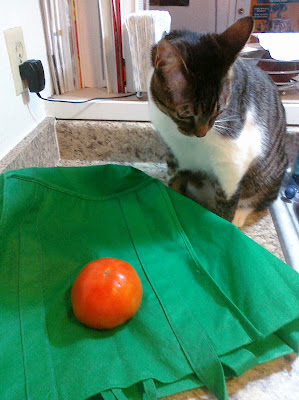Buy Local
 |
| Simon checking out a tomato from the Farmer's Market |
There are two ways to buy local: First buy from any local shop. This includes small business and national chains. Buying online might be more convenient (maybe even necessary sometimes) but buying locally saves on the environmental cost of shipping. The second way to buy local (my focus for today) is to buy local foods. You can buy local food from Farmer's Markets or from your grocery store. A lot of produce stickers now say where the item originated from. If buying from a grocery store, try to find produce and other foods that are made in your state or region. Buying pumpkins from New Mexico is better for Texans than buying pumpkins from Maine. (I don't think they grow pumpkins in Maine, but you get the idea.)
How It Helps: It takes a lot of gas, and therefore oil, to ship our food all around the world. Not only does that shipping process use up gas and oil, but there's also the issue of pollution from the vehicles that transport our food. By buying locally, especially from Farmer's Markets, you get fresher produce that caused less pollution and used up fewer resources. As a bonus- when you buy from Farmer's Markets, you're often buying straight from the farmer helping them to earn more for their produce and giving you the chance to ask questions about the product that grocery stores can't answer (What kind of chemicals are used, if any? When was it picked? What type of cleaning process? etc.)
How To Do It: Buying locally doesn't really take much effort on your part. You just have to plan your list a little better and read some labels. If you're going to buy from Farmer's Markets, you might have to get up a bit earlier or do some research about which one is closest to you. All it takes is for you to be a bit more mindful about the things you are purchasing.
Cost: Farmer's Market produce can sometimes be more expensive (usually because it's organic or better quality) but it can also be a bit cheaper. The above tomato cost me 50 cents. I've found that animal products are usually a bit more expensive, but they're more humanely raised and often organic. Buying locally in your grocery store won't cost you much more than you'd pay for other store produce.
Ask around for your local Farmer's Market or call your city hall to see when it is, and brush up on your local geography! Start buying locally and you'll get hooked.
No comments:
Post a Comment